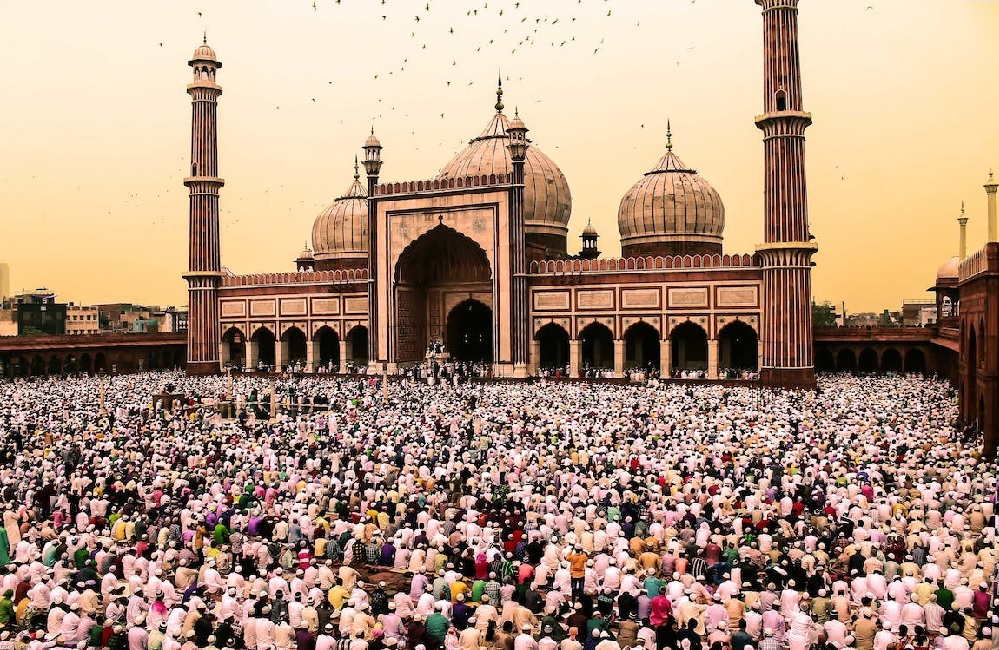India, a land of diverse cultures, celebrates various Muslim festivals with enthusiasm and devotion. These festivals hold immense significance for the Muslim community and are a testament to India’s rich cultural tapestry. Let’s explore some of the major Muslim festivals celebrated in India:
1. Eid-ul-Fitr: Eid-ul-Fitr, also known as “Ramadan Eid” or “Sweet Eid,” is one of the most important festivals in Islam. It marks the end of Ramadan, the holy month of fasting. The festival begins with a special prayer at the mosque, known as “Salat al-Eid,” followed by a sermon. Muslims then visit the homes of friends and family, exchange gifts, and enjoy a lavish feast. Sweet dishes like sheer khurma (a vermicelli pudding) are prepared to celebrate the occasion.
2. Eid-ul-Adha: Eid-ul-Adha, also known as “Bakra Eid” or the “Festival of Sacrifice,” is celebrated to commemorate the willingness of Ibrahim (Abraham) to sacrifice his son Isma’il (Ishmael) as an act of obedience to God. Muslims who can afford to do so sacrifice an animal, typically a goat, sheep, cow, or camel. The meat is distributed among family, friends, and the less fortunate. Special prayers are held at mosques, and families come together to celebrate this festival of faith and charity.
3. Muharram: Muharram is the first month of the Islamic lunar calendar and holds special significance in Islam. It marks the beginning of the Islamic year. The tenth day of Muharram, known as “Ashura,” is observed with great solemnity by Muslims. It commemorates significant events in Islamic history, including the martyrdom of Imam Hussain, the grandson of Prophet Muhammad, at the Battle of Karbala. Shi’a Muslims, in particular, hold processions, participate in reenactments, and engage in acts of charity during this period.
4. Milad-un-Nabi (Eid-e-Milad): Milad-un-Nabi, also known as “Eid-e-Milad” or “Mawlid al-Nabi,” celebrates the birth of the Prophet Muhammad. Muslims gather at mosques to hear sermons, offer prayers, and participate in processions. They also exchange stories from the life of the Prophet and engage in acts of charity and goodwill.
5. Shab-e-Barat: Shab-e-Barat, also known as “Lailatul Barat” or the “Night of Forgiveness,” is observed on the 15th night of Sha’ban, the eighth month of the Islamic lunar calendar. It is believed that on this night, God decides the destinies of people for the coming year and forgives their sins. Muslims spend the night in prayer, seek forgiveness, and visit the graves of loved ones to pay their respects.
6. Ramadan: Ramadan is the ninth month of the Islamic lunar calendar and is considered the holiest month for Muslims. It is a month of fasting, prayer, reflection, and self-purification. Muslims fast from sunrise (Suhoor) to sunset (Iftar), refraining from food, drink, and sinful behavior during daylight hours. The fast is broken with dates and water, followed by a larger meal. The last ten days of Ramadan are particularly significant, as they mark the period when the Quran was first revealed to the Prophet Muhammad.
7. Jumu’ah (Friday Prayer): While not a festival in the traditional sense, Friday holds special importance for Muslims as it is the holy day of congregation and communal prayer. Muslims gather at the mosque for the Jumu’ah prayer, listen to a sermon (Khutbah), and seek blessings for the week ahead.
8. Urs (Sufi Festivals): Urs is a Sufi festival that commemorates the death anniversary of a Sufi saint. These festivals are marked by spiritual gatherings, devotional music (Qawwali), and offerings at the saint’s shrine. Urs festivals are celebrated with great fervor in various parts of India, such as the Ajmer Sharif Urs and the Nizamuddin Urs in Delhi.
Muslim festivals in India are not only religious observances but also occasions of social bonding, charity, and cultural expression. These celebrations reflect the vibrant and harmonious coexistence of different communities in India and showcase the nation’s pluralistic ethos.

